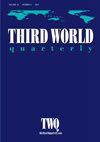Lateral colonialism: exploring modalities of engagement in decolonial politics from the periphery
IF 1.8
2区 经济学
Q2 DEVELOPMENT STUDIES
引用次数: 0
Abstract
Abstract This article contributes to an understanding of how the world outside the Global North is complicit in the visibility politics that render spaces of harm relevant or irrelevant to the reproduction of racism. Extending insights from decolonial theorising, we examine the colonial matrix that produces ongoing legacies of violence and racism through the case of Cyprus. As a peripheral location, Cyprus has been invisible to this story yet had a role in the distribution and mitigation of colonial violence through the institution of what we call lateral colonialism. Through this concept, we explore how peoples otherwise situated and outside the purview of these violences (non-colonisers and non-Blacks) were also enveloped and complicit in them. The case of Cypriots in Africa helps delineate three modalities of this involvement: governmental, entrepreneurial and religious. Lateral colonialism, we argue, is indispensable in linking decolonial possibilities to a global political agenda. The paper re-scripts Africa into Cypriot histories and Cyprus-qua-periphery into the decolonial narrative. In this double sense, lateral colonialism excavates connections that have been forgottern and obscured.横向殖民主义:从外围探索参与非殖民政治的方式
本文有助于理解全球北方以外的世界如何与可见性政治共谋,使伤害空间与种族主义的再生产相关或无关。从非殖民化理论延伸的见解,我们通过塞浦路斯的情况检查产生持续的暴力和种族主义遗产的殖民矩阵。塞浦路斯作为一个外围地区,在这一故事中一直是不可见的,但它通过我们称之为横向殖民主义的制度,在分配和减轻殖民暴力方面发挥了作用。通过这一概念,我们探讨了那些处于这些暴力范围之外的人(非殖民者和非黑人)是如何被这些暴力包围并参与其中的。在非洲的塞浦路斯人的情况有助于说明这种参与的三种方式:政府、企业和宗教。我们认为,横向殖民主义在将非殖民化可能性与全球政治议程联系起来方面是不可或缺的。这篇论文将非洲改写为塞浦路斯的历史,将塞浦路斯的外围国家改写为非殖民化的叙事。在这种双重意义上,横向殖民主义挖掘了被遗忘和模糊的联系。
本文章由计算机程序翻译,如有差异,请以英文原文为准。
求助全文
约1分钟内获得全文
求助全文
来源期刊

Third World Quarterly
DEVELOPMENT STUDIES-
CiteScore
4.10
自引率
15.00%
发文量
137
期刊介绍:
Third World Quarterly ( TWQ ) is the leading journal of scholarship and policy in the field of international studies. For almost four decades it has set the agenda of the global debate on development discourses. As the most influential academic journal covering the emerging worlds, TWQ is at the forefront of analysis and commentary on fundamental issues of global concern. TWQ examines all the issues that affect the many Third Worlds and is not averse to publishing provocative and exploratory articles, especially if they have the merit of opening up emerging areas of research that have not been given sufficient attention. TWQ is a peer-reviewed journal that looks beyond strict "development studies", providing an alternative and over-arching reflective analysis of micro-economic and grassroot efforts of development practitioners and planners. It furnishes expert insight into crucial issues before they impinge upon global media attention. TWQ acts as an almanac linking the academic terrains of the various contemporary area studies - African, Asian, Latin American and Middle Eastern - in an interdisciplinary manner with the publication of informative, innovative and investigative articles. Contributions are rigorously assessed by regional experts.
 求助内容:
求助内容: 应助结果提醒方式:
应助结果提醒方式:


